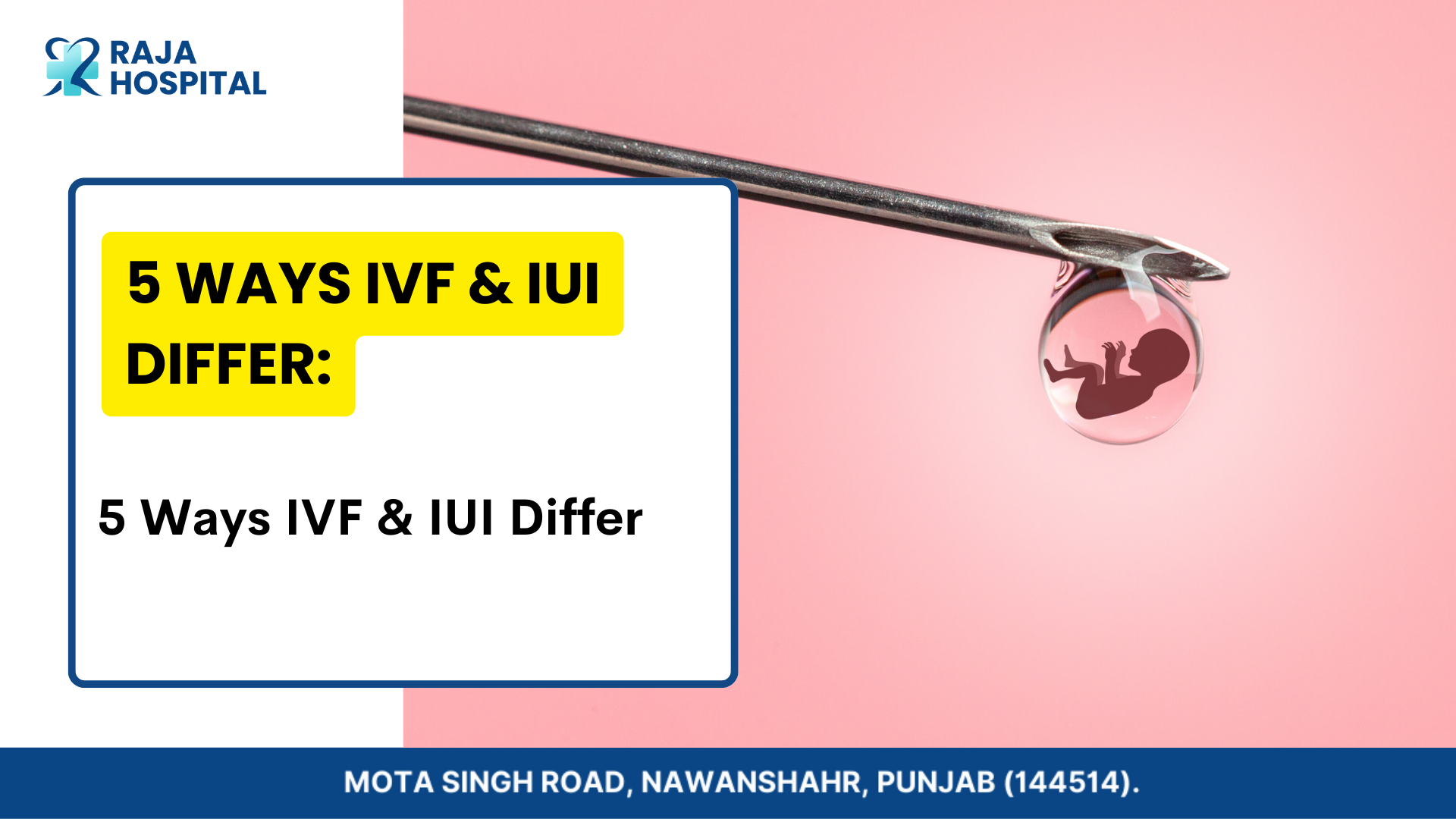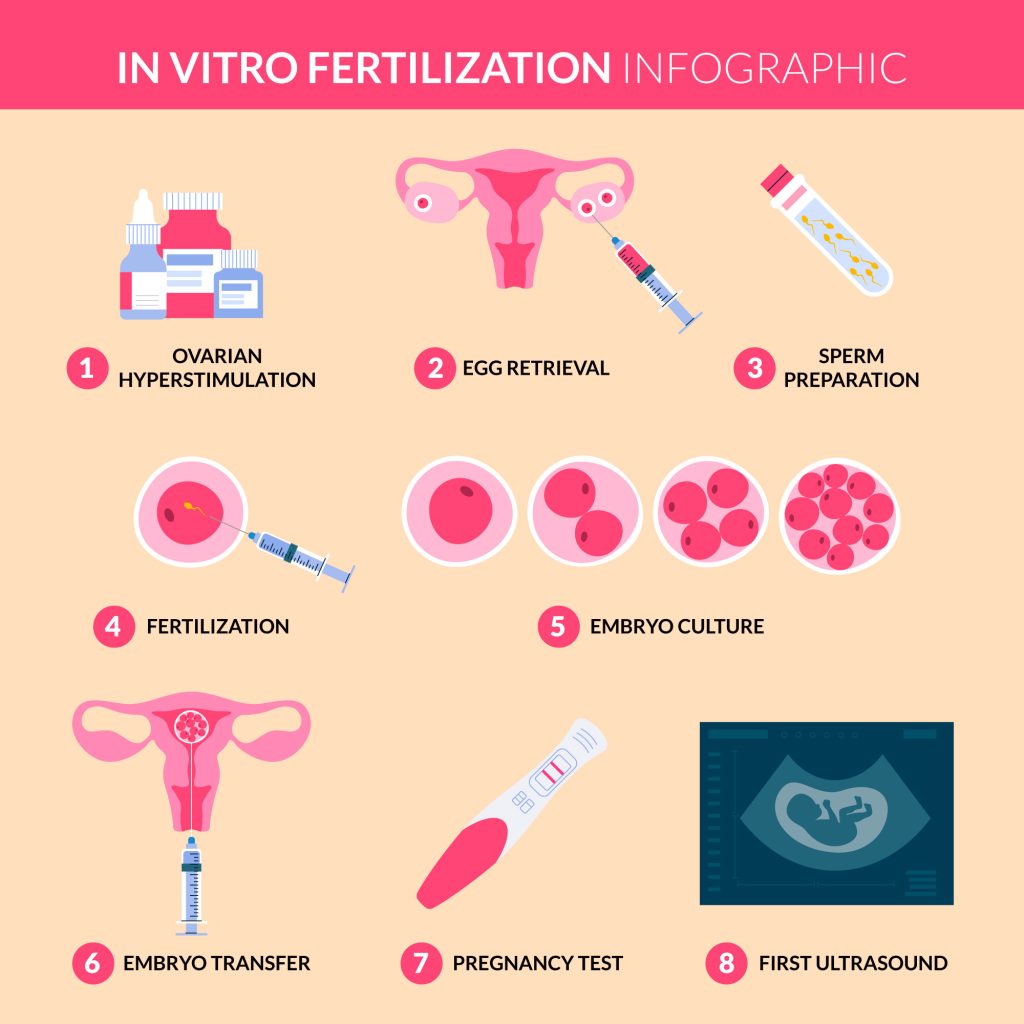5 Ways IVF & IUI Differ: Guide To Your Fertility Journey

REVIEWED BY DR. LAKSHITA SAINI (MBBS, MS OBS & GYNAE) ON 23rd JUNE 2024
Moving into the journey of being a parent can sometimes take guidance, patience, and just a little bit of science. Whether you are at the very beginning stages of considering your options for fertility or much further along in the process, knowing the basic options can go a long way in the process. In this article, we take a closer look at the world of fertility treatment with a focus on two methods highlighted: Intrauterine Insemination (IUI) and In Vitro Fertilization (IVF).
What is IUI (Intrauterine Insemination)?

IUI means intrauterine insemination. Imagine: if a garden needs seeds for sowing to grow plants, it may help by putting the seeds well into the soil just where they need to be put from time to time. IUI, on the other hand, is the process by which a doctor helps by putting the sperm into the uterus, part of where a baby can grow. This way, the sperm will be closer to the egg and, therefore, have more chances to meet it for the woman to become pregnant. It’s a simple procedure that can help couples or individuals who are having a hard time getting pregnant.
What is IVF (In Vitro Fertilization)?
In vitro fertilization (IVF) is a special technique that can help people have a baby if nature is not responding properly. In a small laboratory, the sperm and egg are helped to meet in a small dish outside the body of the woman. If the egg is fertilized and further division occurs, the fertilized egg is gently placed back into the uterus so that it may develop into a baby. IVF is like a helping hand on the journey to becoming a parent, offering hope to many who dream of having a family.
The procedure of IUI and IVF
In the world of baby-making, science has opened doors to amazing possibilities for those facing challenges in conceiving the traditional way. Among these are two superheroes of fertility treatments: Intrauterine Insemination (IUI) and In Vitro Fertilization (IVF).
IUI Procedure
Imagine IUI as a romantic date set up by science for a sperm and an egg. Here’s how it goes down:
Consultation and Testing: You will talk to your doctor a little about your health status and undertake some tests to ensure that you are fit and prepared for IUI.
Ovary Stimulation: The doctor might provide a drug that will stimulate your ovaries in order to urge them to produce eggs. Just think of it as a pep talk for your ovaries! Monitoring: Your doctor keeps an eye on your egg production through ultrasound and sometimes blood tests.
Sperm Collection and Preparation: Even the sperm sample is given a pep talk, ensuring only the swimmers who have trained hard make it to the main event.
Insemination: The sperm, carefully prepared in advance, is gently introduced into the uterus via a slender tube. In essence, this process offers the sperm a direct and privileged route, bypassing the natural means of entry.
The waiting game of two weeks, the longest two weeks of your life, before taking a pregnancy test following the procedure.
IVF Procedure

IVF, on the other hand, is like a meticulous science project with the goal of creating life. Here’s the breakdown:
- Consultation and Testing: Just like IUI, you start with a heart-to-heart with your doctor and some tests.
- Stimulation of the Ovaries: Your ovaries get a super boost from medications to produce multiple eggs.
- Egg Retrieval: When the eggs are ready, they are retrieved gently in a minor surgical procedure. Big day for the eggs!
- Sperm Collection and Preparation: Meanwhile, a sperm sample is prepared for its mission.
- Fertilization: The sperm and eggs are introduced in a lab setting. It’s a bit like matchmaking at a microscopic level.
- Embryo Culture: Fertilized eggs, now embryos, grow in the laboratory for some days, getting strong and ready for their journey.
- Embryo Transfer: One or more embryos are carefully placed into the uterus. It’s a hopeful moment for everyone involved.
The Waiting Game of Again, a two-week wait before a pregnancy test reveals if the IVF procedure has led to a pregnancy.
Risk involvement in both Treatments

IUI and IVF are both modern miracles of medicine that have allowed many individuals and couples the long-hidden dreams of parenthood. Though each procedure does entail some risks.
In Vitro Fertilization (IVF) Risks:
Multiple Pregnancies: IVF increases the chances of a woman getting pregnant with twins, triplets, or more. “Multiples” sound great to the ears of many couples, but it also bears greater risks to the mother and babies, such as prematurity and low body weight.
Ovarian hyperstimulation syndrome (OHSS): This happens in a few women only, and this is due to the response of the ovaries to the hormones given for ovulation stimulation. The ovaries may swell and become painful. Most often, it is transient, lasting only a few days, but very serious cases can last for a couple of weeks.
Emotional and Psychological Stress: The IVF process is such that it is highly emotionally time-consuming, expensive, and involves lots of hopes pinned on the outcome, which may not be advisable for many women. Good support systems should be in place.
Ectopic Pregnancy: There is a slightly higher risk of an ectopic pregnancy with IVF. This happens when the embryo implants outside the uterus, and therefore it is not possible to have a viable pregnancy. It is a medical emergency.
Intrauterine Insemination (IUI) Risks:
Infection: A few rare risks are associated with the IUI procedure, which includes a small chance of infection. However, very rare for one to get infected, and health practitioners exercise high precautions in using sterile techniques.
Spotting: Some women may experience light bleeding from the vagina following the procedure. This normally would not raise too much alarm, but for a host of other women who have had abortions, it is very chilling.
Twin or multiple pregnancies: This may equally occur in IUI by intensifying the number of follicles produced in a cycle when fertility drugs are used for ovary stimulation. Repeatedly, this multiplies the risks of complications during pregnancy and childbirth.
Emotional Strain: While IUI is generally much less emotionally draining compared to IVF, it can still be quite an ordeal if repeated cycles are required. The hope, disappointment, and the roller-coaster of treatment really weigh on people and couples.
IUI and IVF are both modern miracles of medicine that have allowed many individuals and couples the long-hidden dreams of parenthood. Though each procedure does entail some risks, informed
5 Major Differences of IUI AND IVF

Table of Differences:
Create a table that succinctly outlines the key differences between IVF and IUI, including the process, cost, duration, success rates, and level of invasiveness.
Chances of Succession in Both Cases
Both of them are generally more successful than IUI, but also more invasive and expensive, and IVF requires more time. However, the overall IVF success rate varies greatly from one IVF center to another, but usually, an average per cycle has been quoted to be between 20-35%. Often, success is higher among younger women. While the success rate is definitely lower, at about 10-20% per cycle, the success rate is also significantly tied to the woman’s age and the factor causing infertility.
IVF (In Vitro Fertilization):
- Involves egg extraction, fertilization in a lab, and embryo transfer to the uterus.
- Average success rates range from 20% to 35% per cycle.
- Success rates are higher for younger women, often decreasing with age.
- More effective for a wide range of infertility issues, including severe cases.
- More invasive, time-consuming, and expensive than IUI.
IUI (Intrauterine Insemination):
- Involves placing sperm directly into the uterus during ovulation.
- Average success rates range from 10% to 20% per cycle.
- Success largely depends on the woman’s age and the underlying cause of infertility.
- Less invasive and less expensive than IVF.
- Often considered as a first-line treatment before trying IVF.
The choice between IVF and IUI will depend on individual circumstances, including the reasons for infertility, financial considerations, and personal preferences.
Benefits of IUI and IVF

In vitro fertilization (IVF) and intrauterine insemination (IUI) are two commonly used methods to assist with conception. Each offers distinct benefits for individuals or couples trying to conceive.
IUI (Intrauterine Insemination)
- Simple and Quick: Less invasive and faster than IVF.
- Cheaper: Costs less than IVF.
- Good for Certain Issues: Best for mild infertility problems.
IVF (In Vitro Fertilization)
- Higher Success Rate: More effective, especially for those over 35 or with complex fertility issues.
- Solves Various Problems: Can help with many types of infertility.
- Genetic Testing: Allows checking embryos for genetic disorders.
- Flexible: You can choose when to get pregnant and use donor eggs or sperm if needed.
Both IUI and IVF help people have babies. The right one depends on your specific health needs and situation.
When is IUI Recommended and for Whom
IUI is typically recommended for:
- Couples with unexplained infertility.
- Couples with mild male factor infertility.
- Women with mild endometriosis.
- Women use donor sperm to conceive.
- Couples where the female has cervical mucus problems that hinder sperm mobility.
When is IVF Recommended and for Whom
IVF is typically recommended for:
- Women with blocked or damaged fallopian tubes.
- Couples with severe male factor infertility.
- Women with ovulation disorders, premature ovarian failure, or uterine fibroids.
- Couples who have had several failed cycles of IUI.
- Those requiring genetic screening of embryos due to known genetic disorders.
- Women over the age of 40, where fertility issues become more common.
- Same-sex couples or single women using donor eggs or surrogacy.
Choose the appropriate Solution for you

It’s crucial to seek advice from our specialists to determine the most appropriate solution for your specific condition.
For IVF (In Vitro Fertilization): Recommended for individuals or couples facing severe infertility issues such as blocked fallopian tubes, advanced maternal age, or male factor infertility.
For IUI (Intrauterine Insemination): Suitable for couples with mild fertility issues, unexplained infertility, or single women using donor sperm.
Conclusion
So, Your fertility journey can be both exciting and overwhelming. As you navigate through the options of IVF and IUI, remember that you’re not alone. Our team at Raja Hospital understands the importance of this journey and is here to support you every step of the way.
Whether you’re considering IVF or IUI, it’s crucial to understand the differences between the two and how they align with your unique situation. Our specialists are dedicated to providing personalized guidance and expert advice to help you make informed decisions about your fertility treatment.
At Raja Hospital, we believe in the power of hope, science, and compassionate care. Let us be your partners in this incredible journey towards building your family. From initial consultations to treatment options and beyond, we’re here to listen, guide, and support you on your journey to parenthood.
